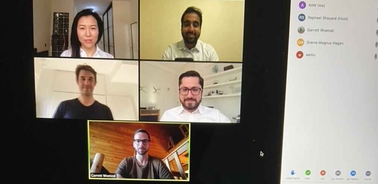- Home
- News And Events
- What’s Going On
- Ie Business School Competes In Mba Impact Investing Network & Training
IE Business School Competes in MBA Impact Investing Network & Training

A team of IE Business School’s MBA students competed in the MBA Impact Investing Network & Training.
For the second year running, IE Business School fielded a team of International MBA students to participate in the MBA Impact Investing Network & Training (MIINT), a collaboration between Bridges Impact Foundation and the Wharton Social Impact Initiative.
Sverre Magnus Hagen, Amit Jethwani, Wei Liu, Raphael Shepard, and Garrett Woetzel made up the IE team, which represented TotalCtrl - a Norway-based social enterprise developing software to prevent food waste. Despite being spread over 5 countries and 3 continents, IE was among 20 teams to make it to the semi-finals out of 130 teams.
The MIINT brings together 350+ MBA students from 31 top global business schools to provide the next generation of impact investors with hands-on experience. Starting with a sourcing and due diligence stage, and followed by a pitch presentation, the investment committee selects the most compelling investment opportunity for a $50,000 investment.
“Since there is real money involved, the participants are not only required to look at the impact value of a firm, but also its commercial value and the return to its investors,” Jethwani said.
“This is an experience, we believe, every masters student would find meaningful and real world insights.”
In addition to capital, the chosen start-up gains international exposure and an opportunity to network with influential players in the ecosystem.
“The MIINT is a great introductory and door opener for any master students who are interested in Impact Investing or social entrepreneurship,” Liu said.
According to Shepard, the “trial by fire experience” proved rewarding and the academic modules provided a solid foundation to understand impact investment thinking and opportunities.
In April, the MIINT competition moved completely online because of the Covid-19 crisis, so final pitches took place over video conference.
“We went from an in-person presentation to a video presentation where even our team members presented across multiple time zones, to an investment committee who also sat scattered across different locations,” Hagen said.
But the students said the effect on the competition reflected reality and further helped them prepare for what lies ahead in their careers.
“[The shift online] presented major challenges on a number of fronts, and perhaps a window into how things will be done differently in the future,” Shepard said.